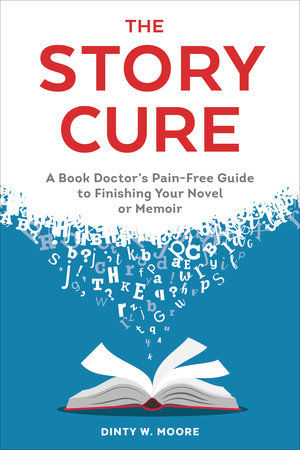Anxiety
The Hipster & the Clairvoyant: 6 Bad Openings for Your Book
Avoid these horrible beginning missteps, says guest poster Dinty W. Moore.
Posted August 5, 2017

Today's delightful—and very practical—post was contributed by Dinty W. Moore, author of The Story Cure: A Book Doctor’s Pain-Free Guide to Finishing Your Novel or Memoir, the memoir Between Panic & Desire, and many other books. (See Moore's full bio below.)
Writing a book, either novel or memoir, is difficult work. Along the way, the writer must make millions of decisions, revise many, many thousands of sentences, sharpen countless images and breathe life into each and every important character, all while trying to keep the entire story alive in her head. Writing a book is not a job to be taken lightly.
There is no one best way to do it, and no perfect formula for beginning, but there are some easy-to-identify missteps a beginning writer can make, including these (somewhat tongue-in-cheek) bad opening paragraphs. As a bonus, one of them comes from a well-loved classic novel. See if you can guess which one it is.
The Premature Cliffhanger
Here I was, flat broke, standing outside a sketchy hipster bar in Brooklyn, and a bearded young man in skinny jeans and a lumberjack’s red plaid shirt was pointing a gun at my head demanding my Uber password. “Move a muscle and I’ll make a kale salad out of your brains,” he snarled.
Okay, you have our attention, for the moment at least, but what happens after you throw your triple chai latte at his face and run screaming into the nearest Whole Foods? Getting a reader’s interest isn’t all that complicated. Keeping it is the more difficult equation.
All the Pretty Adjectives
The deep blue, vanilla-icing-tipped waves surged and swelled beneath the bruise-grey sky swarming now with ebony clouds and swift, swirling, raucous seagulls, as my shapely, chestnut-brunette, green-eyed girlfriend Tawni stepped gracefully into the infinite, watery expanse.
Good for you. I’m glad you and Tawni are having such a fine time and all that. But the surge and swell of purple language here is likely to bruise-grey the reader’s poor brain. A picture, they say, is worth a thousand words, but sometimes it is also true that just a few carefully chosen words are all you need to complete a picture.
Little Did We Know
It was an ordinary day like every other. I stepped out the front door, keys in hand, ready to head off to the gym. Little did I know that in less than fifteen seconds my life would change forever.
The truth is, we almost never see what’s coming. Unless you are a clairvoyant writing the memoir of your fortune-telling career and the plot twist here is that for the very first time ever you couldn’t see what life held in store, there is little reason to tell us that you were caught by surprise.
Plus, this opening is a cliché.
I foresee rejection in your future.
I Was Just Thinking
Ted sat in the coffee shop window pondering the meaning of it all, watching as the sun moved ponderously across the mid-day sky. “Hmm,” he thought. “What is the purpose of life’s existence?”
Hmm, I’m thinking, why am I reading this book? I’ve got my own deep thoughts to keep me distracted, I don’t need Ted’s.
All the World Loves a Puzzle
A destiny that leads the English to the Dutch is strange enough; but one that leads from Epsom into Pennsylvania, and thence into the hills that shut in Altamont over the proud coral cry of the cock, and the soft stone smile of an angel, is touched by that dark miracle of chance which makes new magic in a dusty world.
Hello, hello, you are losing me here! I see a lot of place names, and a rooster (I hope), and an angel, but I’m clueless as to what this opening paragraph might be suggesting. This is a book about enchanted Epsom Salts, maybe?
Poor, Poor Pitiable Me
I really don’t deserve to be treated this way! Growing up, I dreamed of a happy marriage, a happy family, a small spaniel-type dog that sat loyally at my feet, and a life of adventure, but my imbecile of an ex-husband had to fall in lust with his airhead secretary. And now this! This! Oh, how would I ever survive this: I’ve been diagnosed with Irritable Bowel Syndrome? When I told my sister about my condition, she just yawned. Yawned! That ungrateful worm cares more about her fingernails than she does me. My therapist, by the way, is a liar. Did I mention how much I hate my masseuse? And the worst indignity of all, I had to sell off my collection of antique hand mirrors in order to self-publish this book you are reading now because those snooty New York City agents hate me. Life isn’t fair!
I may feel bad for the author of this memoir, but do I want to spend any time with her? No, not really. Irritable Narrator Syndrome isn’t fatal, thankfully, to the author, but it always is to the story. Just tell us readers what you have to tell us, and let us decide how to react.
[By the way, the paragraph above headed All the World Loves a Puzzle is from Thomas Wolfe's Look Homeward Angel.]

GUEST AUTHOR BIO
Dinty W. Moore is author of The Story Cure: A Book Doctor’s Pain-Free Guide to Finishing Your Novel or Memoir, the memoir Between Panic & Desire, and many other books. He has published essays and stories in The Southern Review, The Georgia Review, Harpers, The New York Times Sunday Magazine, Arts & Letters, The Normal School, and elsewhere.
A professor of nonfiction writing at Ohio University, Moore lives in Athens, Ohio, where he grows heirloom tomatoes and edible dandelions.
Copyright (c) 2017 by Susan K. Perry and Dinty W. Moore.




